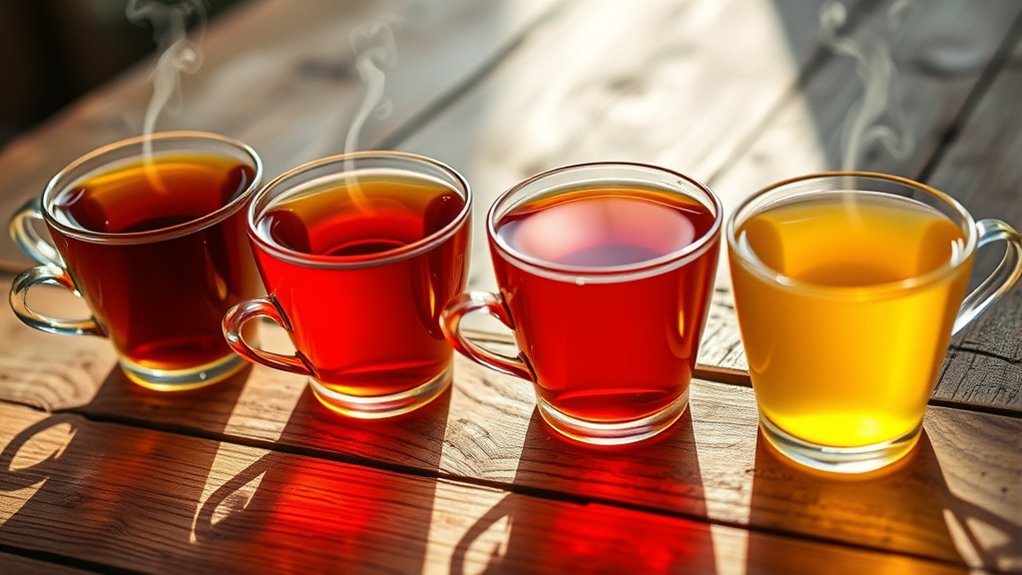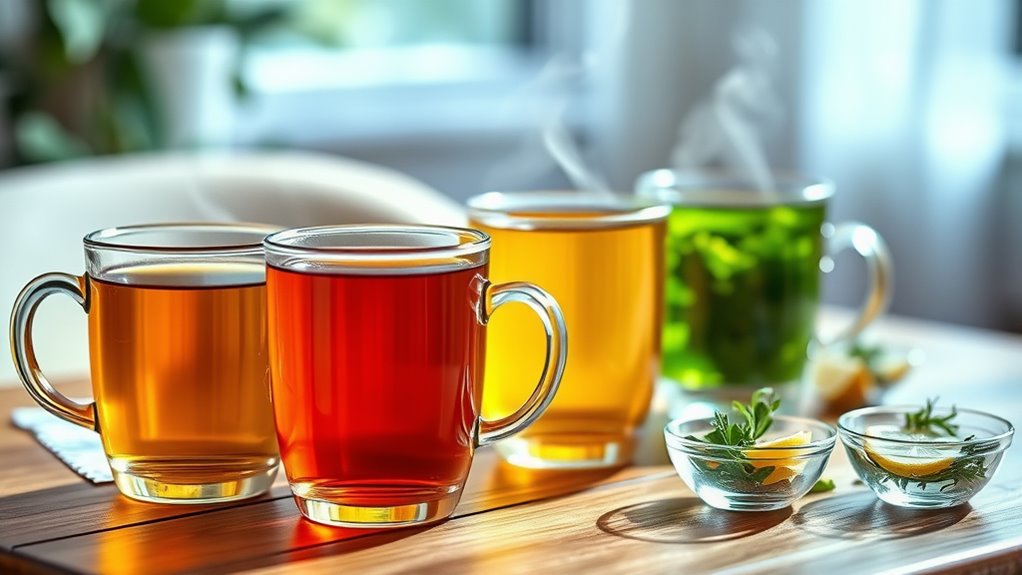To compare teas for heart health, focus on their antioxidants and caffeine levels. Green tea is rich in catechins that support cardiovascular health and has lower caffeine, making it a great morning choice. Black tea contains different antioxidants that may help lower cholesterol and blood pressure but has higher caffeine, which can impact sensitive individuals. Oolong offers a middle ground with moderate antioxidants and caffeine. By understanding these differences, you can pick the best tea to support your heart. Discover more ways to optimize your tea routine below.
Key Takeaways
- Green tea is high in catechins, offering strong antioxidant protection for cardiovascular health.
- Black tea contains antioxidants that reduce inflammation and may help lower blood pressure.
- Oolong tea provides a moderate amount of antioxidants, supporting heart health without excessive caffeine.
- Lower caffeine teas like green and herbal options are preferable for managing blood pressure.
- Proper steeping and avoiding added sugars maximize the heart-friendly benefits of tea consumption.

Tea has long been celebrated for its potential health benefits, especially when it comes to supporting heart health. As you explore different types of tea, you’ll notice that their antioxidant content plays a significant role in their protective effects. Antioxidants help neutralize free radicals in your body, which can cause oxidative stress and damage your arteries. Green tea, in particular, is rich in catechins, a powerful group of antioxidants linked to improved cardiovascular health. Black tea also contains antioxidants, though in slightly different forms, which can still contribute to reducing inflammation and lowering blood pressure. Oolong tea falls somewhere in between, offering a moderate amount of antioxidants that can support your heart. When choosing a tea for heart health, consider not just the antioxidant content but also how caffeine levels might influence your overall well-being.
Caffeine levels vary considerably among different teas, and understanding these differences can help you make better choices. Green and white teas generally have lower caffeine content, making them ideal if you’re sensitive to caffeine or want to limit your intake. Black tea tends to have higher caffeine levels, providing a gentle boost of energy without overdoing it. Oolong tea usually falls in the middle, offering moderate caffeine that can help increase alertness without causing jitters. If you’re aiming to support your heart health while managing caffeine, herbal teas like chamomile or peppermint are naturally caffeine-free options that still provide beneficial antioxidants. Keep in mind that caffeine can temporarily raise your blood pressure, so if you already have hypertension, sticking to lower-caffeine or caffeine-free teas might be wise.
Balancing antioxidant content with caffeine levels allows you to enjoy tea’s heart-healthy benefits without unwanted side effects. For example, drinking green tea in the morning can provide a boost of antioxidants along with a modest caffeine lift, helping you stay alert while protecting your arteries. If you prefer a stronger flavor and are less sensitive to caffeine, a cup of black tea can add more antioxidants to your day, potentially aiding in cholesterol management. Remember, the way you prepare your tea also matters—steeping it for the right amount of time maximizes antioxidant release, and avoiding added sugars keeps it heart-healthy. By understanding the differences in antioxidant content and caffeine levels among various teas, you can tailor your choices to fit your health goals, making tea a simple yet effective part of your heart health routine. Antioxidant content
Frequently Asked Questions
Can Tea Replace Medication for Heart Health?
Tea can’t replace medication for heart health, but it can be a helpful natural remedy to support your overall well-being. While some teas, like hibiscus or green tea, offer antioxidants and other benefits, they shouldn’t be viewed as medication alternatives. Always talk to your doctor before making changes to your treatment plan, and use tea as a complementary addition to prescribed medication rather than a replacement.
Are There Any Side Effects From Drinking Heart-Healthy Teas?
Think of tea as a double-edged sword—while it offers heart benefits, it can also have side effects. If you have tea allergies, you might experience reactions like itching or swelling. Caffeine concerns are another factor; too much can cause insomnia or jitteriness. Always monitor your body’s response, and if you notice adverse effects, consider switching to herbal or decaffeinated options. Moderation is key to enjoying the positive effects safely.
How Much Tea Should I Drink Daily for Benefits?
For heart health benefits, aim for about 3 to 4 cups of tea daily. This tea consumption provides antioxidants and other nutrients without risking side effects from excessive intake. Keep in mind that moderation is key; too much caffeine can cause issues. Stick to this daily intake to enjoy the benefits while avoiding potential drawbacks, and consider brewing weaker tea if you’re sensitive to caffeine.
Do Herbal Teas Have the Same Heart Benefits as Green or Black Tea?
Herbal teas can offer heart benefits similar to green or black tea because they contain herbal antioxidants that support cardiovascular health. While they don’t have caffeine, a tea infusion of herbs like hibiscus or chamomile can help reduce blood pressure and improve circulation. Just remember, variety is key, so incorporate different herbal infusions into your routine along with traditional teas for ideal heart health benefits.
Can Tea Consumption Prevent Heart Disease Altogether?
Imagine your heart as a fortress, and tea antioxidants are your vigilant guards. While drinking tea can lower your cardiovascular risk, it won’t completely fend off heart disease. Regular tea consumption helps strengthen your defenses, but a healthy lifestyle—balanced diet, exercise, and no smoking—remains essential. So, yes, tea can be a valuable ally, but it’s not a magic shield that prevents heart disease altogether.
Conclusion
So, after all this, you’re better off just gulping down a variety of teas and pretending you’re a heart-healthy connoisseur. Who needs fancy pills or lifestyle changes when a cup of green, black, or white tea can save the day? Just remember, no matter how much you sip, your heart still might not thank you if you ignore the basics. Cheers to pretending we’re all health gurus—one sip at a time.










